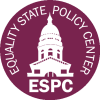When the Secretary of State posted his proposed rules to Chapter 2 of the Wyoming election procedures, the Equality State Policy Center felt compelled to speak out against burdensome changes to the election process so close to an election. Thus began ESPC’s journey to mobilize, educate, and advocate for change.
Our first step in addressing the situation was to submit a records request to the Secretary of State’s office to view election-related complaints, providing context for this rule change. The complaints were overwhelmingly related to campaign violations.
Then, we submitted public comments to the Secretary of State and called for a public hearing on the rule—along with a handful of partner organizations and individuals. We also reached out to our supporters—like you!—to submit written public comments.
During the hearing in January, ESPC testified in opposition to the proposed rule and was among many other longstanding organizations to do so. We appreciate everyone who gave their time to write, testify, or share the opportunity to give public comments! With your help, we took one step closer to fair elections.
We navigated through the rulemaking process, writing a letter to the Legislative Management Council urging them to recommend a rejection of these proposed rules.
However, the Governor is the only person who can firmly reject the rules. We also penned a letter to Governor Mark Gordon requesting the rejection of those rules. Many of you reached out and shared your concerns about the rules with the Governor—thank you!
Unfortunately, the fair elections community doesn’t always get to celebrate success in Wyoming. In this case, our efforts bore fruit. Through a groundswell of grassroots activism, combined with strategic advocacy at every level, the fair elections community succeeded in getting these rules rejected.
In the end, it was the power of community that carried us to victory. Our success was not achieved in isolation but was the result of a collective effort, fueled by the shared belief in fair elections and the power of democracy. Together, we stood up, spoke out, and made our voices heard, proving that when we unite behind a common cause, there is no limit to what we can achieve.
Interested in the rulemaking process? Read more here.

